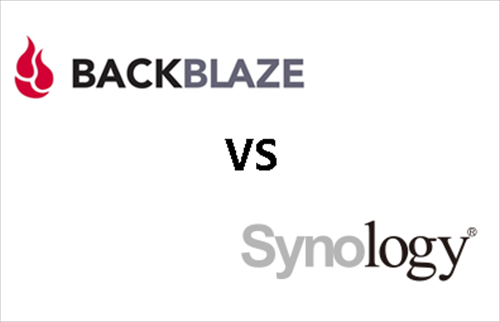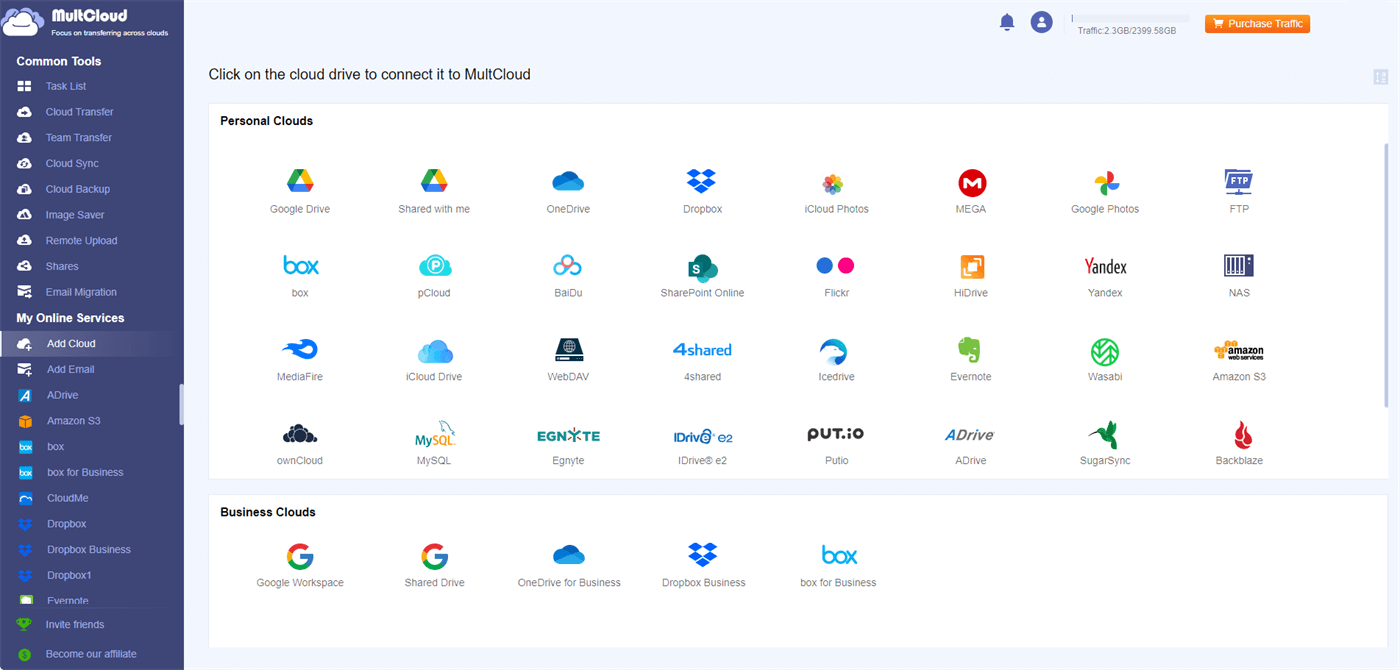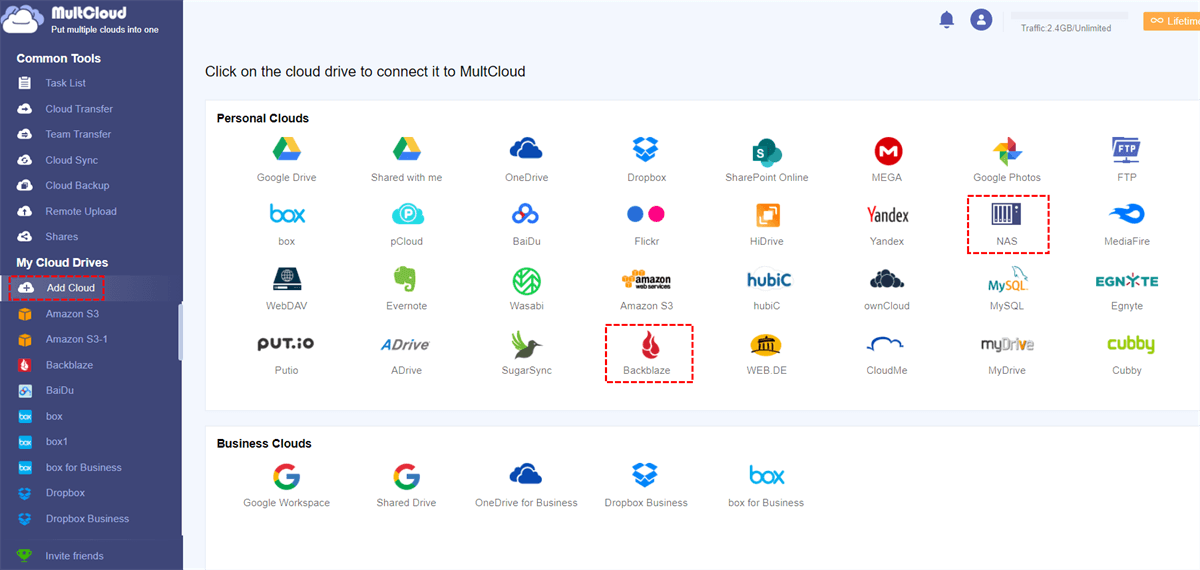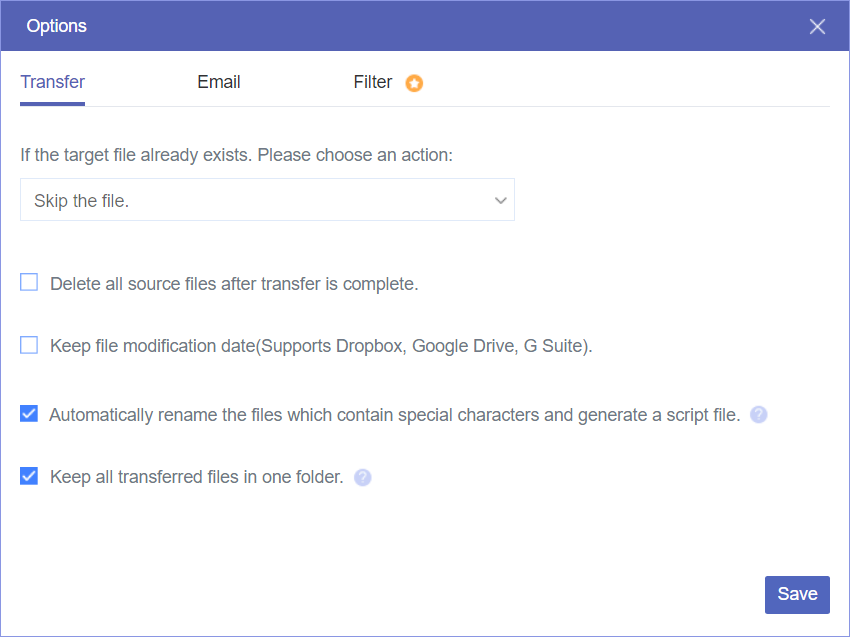What is Backblaze B2?
Backblaze B2 is a cloud storage service known for its simplicity and affordability. Developed by Backblaze, B2 offers you a cost-effective solution for storing, retrieving, and managing data in the cloud. Its transparent pricing model charges you based on your actual storage usage and data transfer, making it an attractive option for businesses with varying storage needs.
Backblaze B2 supports essential features like data encryption, versioning, and lifecycle policies, ensuring data security and control. Popular among developers, startups, and enterprises, Backblaze B2 provides a scalable and reliable cloud storage solution, allowing you to seamlessly scale your storage capacity without incurring high costs.
What is Synology C2?
Synology C2 is a cloud backup service offered by Synology, a leading network-attached storage (NAS) solution provider. Launched to complement Synology's NAS products, C2 provides you with a secure and efficient way to back up your data to the cloud. It offers features such as file versioning, data deduplication, and encryption, ensuring the protection and privacy of your data.
Synology C2 allows you to easily back up NAS data, applications, and system configurations to the cloud for off-site storage, enhancing redundancy and disaster recovery. It integrates seamlessly with Synology NAS devices, providing a user-friendly interface and robust security for reliable cloud backup solutions tailored to Synology's hardware and software ecosystem.
Backblaze B2 vs Synology C2 – Compare in 4 Main Aspect
To further explain the differences between Synology C2 vs Backblaze B2, this part will show you the comparison in 4 main aspects: pricing, backup and restore features, transfer speed, and user experience.
Backblaze B2 vs Synology C2: Pricing
| Price | Advantages | |
|---|---|---|
| Backblaze B2 |
$6/TB/month $19,500, 250TB/year |
Free for up to 3x of average monthly data stored, then $0.01/GB for additional egress |
| Synology C2 |
Basic:
Advanced: $69.99/TB/month |
Basic:
Advanced:
|
Backblaze B2 vs Synology C2: Backup and Restore Features
Both Backblaze B2 and Synology C2 are cloud storage services that offer backup and restore features, but they serve slightly different purposes.
| Backup Features | Restore Features | |
|---|---|---|
| Backblaze B2 |
|
|
| Synology C2 |
|
|
Backblaze B2 vs Synology C2: Transfer Speed
The transfer speed of Backblaze B2 and Synology C2 can be influenced by various factors, and it's important to note that the speed may vary based on your specific circumstances. Here are some considerations for each service:
Backblaze B2:
- Network Speed: The upload and download speeds to and from Backblaze B2 will depend on your internet connection. Faster internet connections generally result in quicker data transfers.
- Data Centers: Backblaze B2 has multiple data centers, and the proximity of your location to these data centers can impact transfer speeds. Selecting the closest data center when configuring your storage may improve performance.
Synology C2:
- NAS Device Performance: The transfer speed with Synology C2 will be influenced by the performance of your Synology NAS device. Higher-end NAS models with better hardware specifications may result in faster transfers.
- Internet Connection: As with Backblaze B2, the speed of your internet connection is a crucial factor. Ensure that your internet service provides sufficient bandwidth for optimal performance.
Backblaze B2 vs Synology C2: User Experience
The user experience of Backblaze B2 and Synology C2 can be subjective and depends on your preferences, technical expertise, and specific needs. Here's an overview of the user experience of both services:
Backblaze B2:
- Web Interface: Backblaze B2 provides a straightforward and user-friendly web interface for managing your cloud storage. Users can easily navigate and perform tasks such as uploading, downloading, and managing files.
- Integration: Backblaze B2 is designed to work with a variety of third-party applications and services, making it versatile for those who want to integrate it into their existing workflows.
- Setup: Setting up and configuring Backblaze B2 is generally considered to be user-friendly. The process involves creating an account, setting up a bucket (storage container), and obtaining API keys for authentication.
Synology C2:
Integration with Synology NAS:
- Synology C2 is tightly integrated with Synology NAS devices, providing a seamless experience for those who are already familiar with the Synology ecosystem.
- The configuration and setup are streamlined for Synology NAS users, making it convenient for those who prefer an all-in-one solution.
Synology DSM Interface:
- You can access Synology C2 through the DSM (DiskStation Manager) interface, which is the operating system for Synology NAS devices. This interface is generally user-friendly and feature-rich.
- The DSM interface offers a range of tools and applications like Synology Cloud Sync, and you can manage backups and restores within the familiar environment of your Synology NAS.
Backblaze B2 vs Synology C2: Conclusion
Choosing between Backblaze B2 and Synology C2 hinges on specific needs. Backblaze B2 boasts competitive pricing based on storage usage, offering simplicity and reliability. Synology C2, with a potential tiered pricing structure, integrates seamlessly with Synology NAS devices, providing additional features like snapshot replication.
Backblaze B2 excels in fast upload and download speeds, ensuring efficient data transfers. Synology C2's speed may vary based on factors like internet connection and NAS device capabilities. Besides, user experience differs from Backblaze B2 featuring a user-friendly interface suitable for all users, while Synology C2 provides a cohesive experience for those within the Synology ecosystem.
The choice boils down to your requirements, budget constraints, and preference for standalone cloud services or integrated solutions, with both services offering reliable options.
Bonus Tip: How to Automatically Transfer Backblaze B2 to Synology NAS
If you use both Backblaze and Synology NAS, you may encounter a scenario that requires you to transfer files from Backblaze to Synology NAS. Except for the traditional downloading and uploading way, there is a brand-new automatic solution – using MultCloud, a free but professional cloud file transfer service that supports 30+ different clouds.
You can choose different MultCloud functions to do the file transfer. For various transfer options, you can use Cloud Transfer to directly copy Backblaze files to Synology NAS, or vice versa. Or, if you want to integrate Backblaze with Synology NAS, you can use Cloud Sync to sync files between them in real time. Besides, to backup files from Backblaze to Synology and restore with versions, Cloud Backup can be taken advantage of.
The steps for using Cloud Transfer, Cloud Sync, and Cloud Backup are quite similar. After getting a MultCloud account, you will: add Backblaze and Synology NAS to MultCloud > choose the source and the target > initiate the task. Let’s see how to use Cloud Transfer as an example.
Step 1: Go to MultCloud and sign up by clicking “Get started for free”.
Step 2: Add Backblaze and Synology NAS to MultCloud by selecting “Add Cloud” and their logos.
Step 3: Click “Cloud Transfer” and then choose Backblaze in the left box and Synology NAS in the right box.
Step 4: Open “Options” to check transfer settings and tap “Transfer Now” to start this task.
Conclusion
You must know more about Backblaze B2 vs Synology C2 from this post. Pick the preferred one with the comparison in the above 4 aspects! If you think both of these 2 clouds are of good use and cannot decide, you can use both of them. When you need to transfer files from one cloud to another, try MultCloud functions for its automatic process and considerable features.
MultCloud Supports Clouds
-
Google Drive
-
Google Workspace
-
OneDrive
-
OneDrive for Business
-
SharePoint
-
Dropbox
-
Dropbox Business
-
MEGA
-
Google Photos
-
iCloud Photos
-
FTP
-
box
-
box for Business
-
pCloud
-
Baidu
-
Flickr
-
HiDrive
-
Yandex
-
NAS
-
WebDAV
-
MediaFire
-
iCloud Drive
-
WEB.DE
-
Evernote
-
Amazon S3
-
Wasabi
-
ownCloud
-
MySQL
-
Egnyte
-
Putio
-
ADrive
-
SugarSync
-
Backblaze
-
CloudMe
-
MyDrive
-
Cubby







